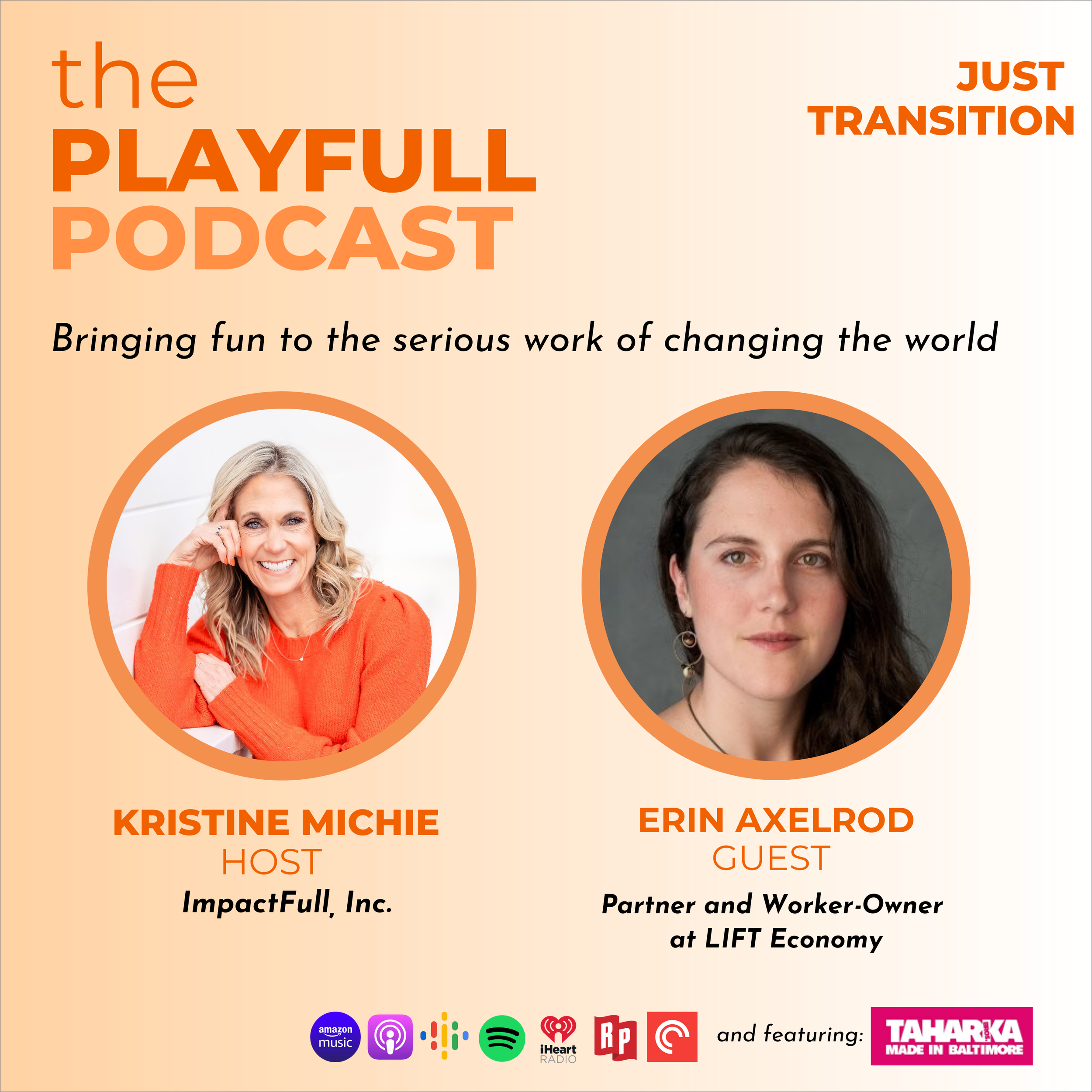Erin Axelrod: Equalizing Access to the Tools and Levers that Grow the Economy
SUBSCRIBE TO THE PODCAST:
Spotify | Apple Podcasts | Amazon Music | Google Podcasts | Pocketcasts | RSS | RadioPublic | I Heart Radio
Erin Axelrod: Equalizing Access to the Tools and Levers that Grow the Economy
In this episode, Kristine Michie sits down with Erin Axelrod from LIFT Economy to explore the mechanisms and practices that support the growth of a non-extractive, regenerative economy. Challenging traditional business paradigms, Erin explores how worker-owned enterprises, B-Corps movement, and even potluck dinners can transform economic systems to benefit all life - not just humans, but entire ecosystems. Blending examples of serious systemic change with a playful approach and homemade ice cream, this conversation offers a radical reimagining of how we understand business, purpose, and our collective home.
Key Takeaways:
Businesses should be regenerative by design, ensuring economic success is aligned with sustainability, community well-being, and long-term resilience.
Regenerative principles extend beyond agriculture and can be applied to economic systems, governance, and business operations to create holistic transformation.
Worker-owned cooperatives, built on the principle of “one worker, one vote,” lead to greater resilience, fair wages, and shared prosperity.
Economy and ecology have the same root word, “eco” which means home. The prevailing extractive mindset wants us to think of these things as separate but they are not.
Instead of prioritizing shareholder profits above all, businesses should consider all stakeholders—including workers, communities, and the environment—to create a more just economy.
Alternative ownership structures, such as cooperatives and mission-locked businesses, provide a pathway to long-term financial resilience while staying true to ethical principles.
Economic transformation requires rethinking business design at every level, from ownership to decision-making structures, to create an economy in balance with ecosystems.
"We believe that the next economy inevitably has to be one that's in balance with our ecosystems, and especially with human ecosystems being in balance with one another." — Erin Axelrod
"When we think about the existential crisis for so many species on the planet, it really is imperative for human sustenance to make sure that the planet works for those more-than-human species as well." — Erin Axelrod
"Let's get back to the root of the word "economy." It's home care, and we share this home planet with all of life, not just humans." — Erin Axelrod
More about Erin Axelrod:
Erin Axelrod is a partner and worker-owner at LIFT Economy where she accelerates ecological and justice-centered businesses in the Next Economy. She does this through client work, a 9-month online learning journey called the Next Economy MBA, and a regenerative agriculture investor network. She co-founded the Force for Good Fund - a $1.1M pilot fund that invested in 13 women and POC-lead social enterprises. When not working, she loves to plant trees, raise backyard chickens, milk goats and harvest wild foods like mushrooms, greens, elderberries, and bay nuts to make nutrient-dense foods for her community. Erin's 16-month old keeps her laughing on the trampoline and entertained by the never-ending joy of tickling each others' bellies.
Connect with Erin:
Website: https://www.lifteconomy.com/
Company LinkedIn: https://www.linkedin.com/company/lifteconomy/
Erin’s LinkedIn: https://www.linkedin.com/in/erinaxelrod/
Facebook: https://www.facebook.com/LIFTEconomy/
Twitter: http://twitter.com/lifteconomy
Next Economy Now Podcast: https://podcasts.apple.com/us/podcast/next-economy-now-for-the-benefit-of-all-life/id1074584017
Connect with Kristine:
Website: https://www.impactfullinc.com/
Instagram: https://www.instagram.com/impactfull_inc
LinkedIn: https://www.linkedin.com/in/kristine-breese-michie/
Sources from this episode:
BOOKS
The Next Economy MBA by Lift Economy: Axelod, Bayuk, Berry, Honeyman, Soleil
https://www.bkconnection.com/books/title/The-Next-Economy-MBA
Never Alone by Woniya Dawn Thibeault: https://bookshop.org/p/books/never-alone-a-solo-arctic-survival-journey-woniya-dawn-thibeault/20004803
Braiding Sweetgrass by Robin Wall Kimmerer: https://bookshop.org/p/books/braiding-sweetgrass-robin-wall-kimmerer/16712606
Grow Wild by Katy Bowman: https://bookshop.org/p/books/grow-wild-the-whole-child-whole-family-nature-rich-guide-to-moving-more-katy-bowman/15589658
Next Economy MBA by Lift Economy: https://bookshop.org/p/books/the-next-economy-mba-redesigning-business-for-the-benefit-of-all-life/18948897
Beyond the B Podcast: https://podcasts.apple.com/us/podcast/beyond-the-b-latest-on-the-b-corp-movement/id1747076048
Audio production by Turnkey Podcast Productions. You're the expert. Your podcast will prove it.

